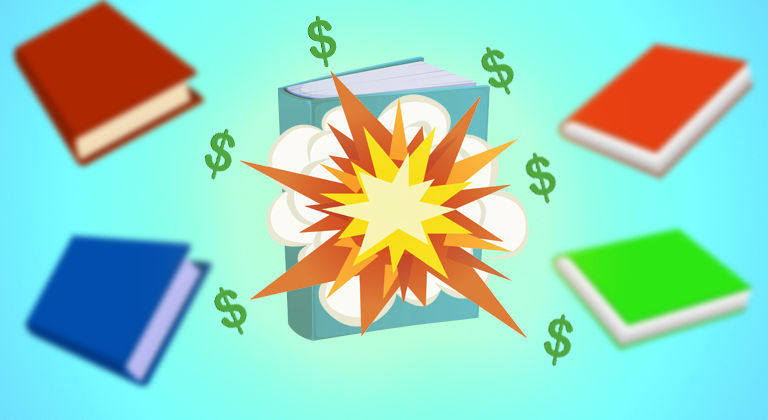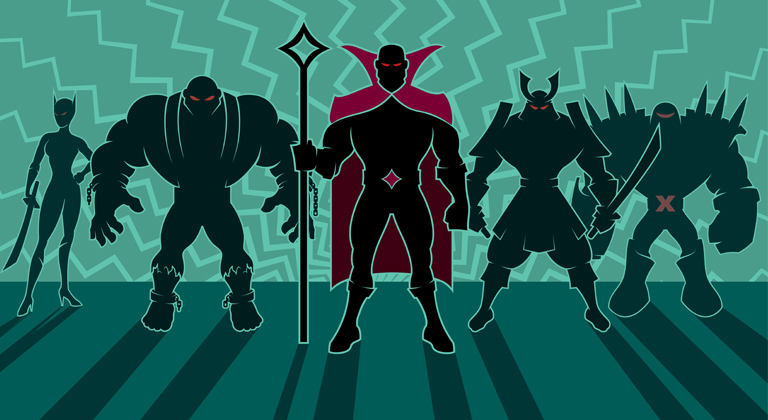Wait, is there a FIFTH way to sell books?
When Ginger posted his blog last week, at least one reader took exception to his stance that there were only four ways to effectively sell books, pointing out that a well-crafted book with effective marketing can also lead to success, even if it doesn’t result in overnight stardom.
This question led Ginger to wonder whether there was a fifth way to sell books, and in today’s article he explores this topic by delving into the nuances of book sales, the definition of success and the effect of multiple factors working together to help build your career as an author.
Last week I wrote a blog post entitled “The ONLY Four Ways to Sell Books” and not everybody was thrilled with it. One of our wonderful readers, Bonnie Bonaduce, had this to say about it:
I have to say, this post was quite upsetting. As a new author recently published last month with a current 5 Star rating, to be told there are ONLY 4 ways to succeed in sales is crushing! And I believe, wrong. While one might not make a huge immediate splash, a solid, well-crafted book with interesting characters and plot can certainly succeed with effective marketing. Not every book can be a unicorn success!
I think Bonnie raised a point worthy of conversation, so I wanted to address it by pondering this question:
Is there a magical FIFTH way to sell books that I’d overlooked in my post? Or are there really only FOUR?
In my article, I proposed the concept that there were only four guaranteed ways to sell book. In a nutshell, these four ideas were:
- Be an author people already know – Whenever there’s a new Stephen King or Lee Child book out, I’ll jump on Amazon and buy it. If you’re an author with an established following, you’ve got a guarantee that many of your readers will buy each and every new book you publish.
- Have a killer hook! – If you’re publishing a book with a killer concept, curious readers might gamble on buying it even if you’re a lesser-known author. That’s what led to breakout self-published hits like Andy Weir’s The Martian.
- Become embraced by a community – If a celebrity like Oprah Winfrey decides to feature your novel in her book club, you’re guaranteed to have a hit on your hand. To a lesser extent, being featured on a blog tour or as part of a smaller book club will guarantee a boost in sales.
- Solve a really big problem – If you’re writing a non-fiction book that solves a specific problem, or speaks to a specific audience, you’ll find yourself able to sell copies of it through effective marketing. I discovered this when a book on Intermittent Fasting I wrote called The Cheat Code proved to be a hit with middle aged guys who wanted to stay trim, but still drink beer and eat burgers.
I’m not going to lie – I still stand by what I wrote.
I think these four elements provide the only proven way to shift copies of your book. If you’re not leveraging at least one of them, you’re making it a lot more difficult to profitably market or advertise your writing.
However, at the same time, I think Bonnie addresses a valid point. There are authors out there consistently selling a modest number of their books even without them being shiny and overt examples of any of these four specific sales tactics.
So, what gives? Is there any credence to what I wrote? Or is there a mysterious fifth way of selling your books that I didn’t address in my article?
Here’s what I think:
Firstly, how do you define success?
I think the first point to address so that Bonnie and I are on the same page is this comment she wrapped up with: “Not every book can be a unicorn success!”
You’re right! In fact, breakout bestsellers are definitely the exception rather than the rule when it comes to self-publishing – and when an author does win the literary lottery and self-publishes a bestseller, I stand by my belief that it’ll always be a result of one or more of those four sales concepts I outlined above.
However, a book doesn’t need to top the bestseller charts to be considered a success – so when Bonnie argues that “a solid, well-crafted book with interesting characters and plot can certainly succeed with effective marketing” I think she’s arguing exactly the same point that I am. The only bone of contention is scale.
I’d consider any book that can deliver profitable book sales (as in, bring in more in royalties than you spend advertising it) should be classified as a success; even if it hasn’t turned you into an overnight celebrity or scored a movie option (yet!)
If you’ve written a book that consistently makes you a profit, you should be able to scale up your marketing and eventually make real money from it; and I still argue that this will only be because it leverages one or more of the four essential elements I outlined above – most likely that “killer hook” I wrote about.
But Bonnie’s got a point. A hook doesn’t need to be outrageously “killer” to get readers to take a chance on it. It merely needs to be just-about-killer-enough. The metric for success is your conversion rate and while a “killer” hook might have one out of every three people who click on your ad becoming a reader, a less compelling hook can score one new reader for every twelve clicks and still ensure you’re spending less on advertising than you’re earning in book sales. Either way, your book is successful!
So, don’t dismiss the merits of a book that’s slow-burning its way to success. In addition to making you money, that book is building the foundation of the first secret to success I wrote about – having an audience of readers who know you and are familiar with you. Every book you write following this first one will help build and grow that readership even if it’s not what Bonnie describes as “a unicorn success!”
Secondly, you don’t need ONE of those four elements if you’ve got a combination of SOME of them
I don’t think there’s a magical “fifth” way to sell books – but I do think a combination of some or all of the other four ways could certainly make it look like there is.
For example, maybe the hypothetical book Bonnie was talking about (the one that was “a solid, well-crafted book with interesting characters and plot”) combines a “just-killer-enough” hook with a back catalog of other solid titles from the same author. That way, readers hovering over the “buy now” button build a picture of this book that’s greater than the sum of its parts.
If the “hook” is just compelling enough to pique interest and the author has penned similar books with some solid reviews, the combination of those elements together could trigger a sale that the book wouldn’t have earned if the author had relied on either of those elements alone.
I think the importance of combining those tactics shouldn’t be overlooked – and I speak from experience! When I first found success as an author, I’d written a romance book with a lurid “killer hook” that scored me hundreds of sales every day. The next book in the series wasn’t quite so lurid – but because it still had a fairly strong hook and it was by an author with a fairly successful previous book, readers gave it a chance in a way that they wouldn’t (and didn’t) have done with my earlier books.
Lastly, careers are built on modestly successful books
Rome wasn’t built in a day, and neither is a successful career as a self-published author. While self-publishing phenomenons like Andy Weir and E.L. James show us that anything is possible, most authors have to build a foundation for their career before they can leverage it.
That means “a solid, well-crafted book with interesting characters and plot” like the one Bonnie writes about might not be the book that launches your career into breakout success, but your later books which are successful could never have become so without it.
Always remember that you’re building something bigger than the sum of its parts when you write and self-publish a new book. Each new title is a cornerstone of your literary empire; and one day they’ll hopefully stand as the foundation from which you can then publish successful title after successful title.
The book you might not think of as successful now could be the one that later tips the balance of the Amazon algorithm in your favor.
Conclusion
I still stand by my argument that there are only four ways you’re guaranteed to sell books – but I think Bonnie Bonaduce raised a valid point when she left her comment. There’s more to becoming a successful author than chasing after esoteric sales concepts – and even if your books aren’t outrageously successful right now, they’re ideally going to be successful enough in the future to build a future career on.
But I’d still argue that every book that makes money, or can be advertised at a profit, leverages one of those “four ways to sell books” that I previously wrote about – or a combination of them.
Those are the concepts that get people to click on your ads, click Read More on your blurbs, and eventually click Buy Now on your books – and the more you recognize that and lean into the idea, the more successful I truly believe you’ll become.












Best blog yet. Being open to have the conversation makes the dialogue/content even more valuable.